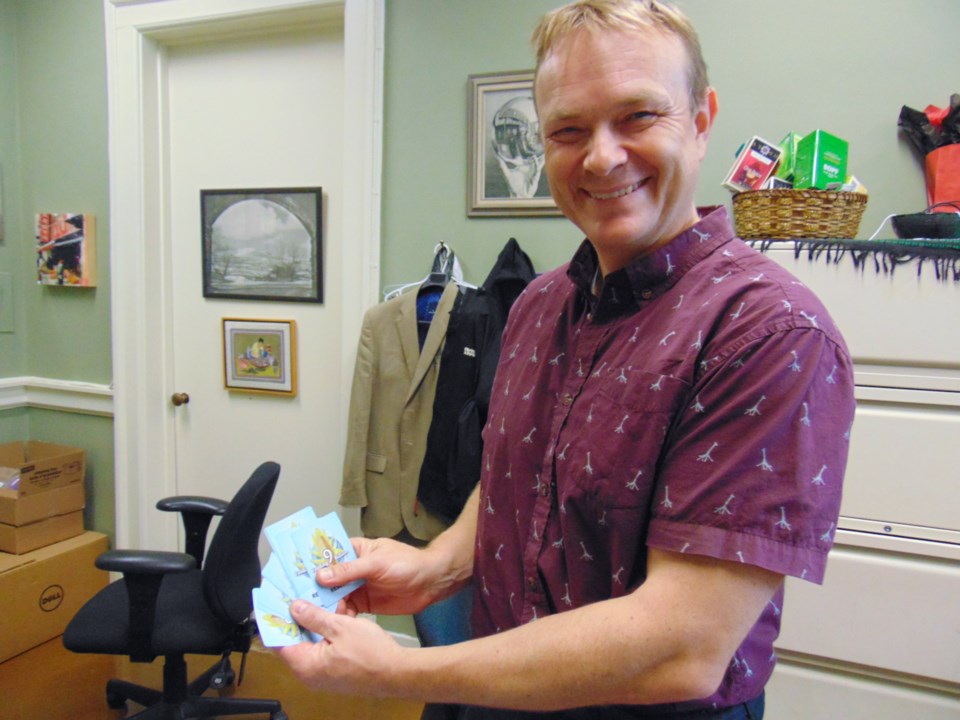It’s not just fun and games for University of Guelph geography professor Evan Fraser.
Fraser recently won gold at the Serious Play Board Games Competition for his novel card game, Feeding 9 Billion.
The game is designed for high school teachers to introduce their students to basic concepts such as food security, agriculture, nutrition and climate change.
“I love board games and so I developed a card game similar to one I played with my nine-year-old,” Fraser said.
And soon after, what were once used as recipe cards, turned into game cards.
“Going back about eight years ago, I had written books on food sustainability. I began brainstorming with my little sister and I thought, things are really changing,” Fraser said.
“So, I wanted to do something different because books just didn’t seem to have the same impact anymore,” Fraser said.
The game was developed by Fraser, who is also the director of the Arrell Food Institute at the U of G.
The Arrell Food Institute is dedicated to bringing people together to conduct research, train the next generation of food leaders and shape social, industrial and governmental decisions, while ensuring that food, is the central priority.
“The mission for the institute is to elevate food to improve life,” Fraser says.
“And part of that is working with youth. But even before the institute came to be, this game was a personal passion of mine.”
And for Fraser, bringing youth together into the discussion, is key.
The game includes lesson plans on how high school teachers can integrate food security issues into their classrooms.
“This is super targeted on youth,” Fraser says.
“There is critical thinking, but it’s made to be fun. There is a booklet included with the game so teachers have an idea of what they should debrief afterwards and with the right debrief at the end, this is what makes the game link with these real-life issues.”
The Serious Play Board Games Competition took place at the University of Central Florida in July.
Founded in 2009, the Serious Play Conference is a leadership conference for professionals who embrace the idea that games can revolutionize learning.
Participants from all parts of the world share their experiences in creating or using games in their organizations including healthcare, government, military and education.
And Fraser’s game, Feeding 9 Billion struck gold.
“I had never entered the competition before. I just stumbled upon it and thought it sounded like a great idea,” Fraser said.
Feeding 9 Billion asks players to make choices about food resources under progressively more difficult circumstances, similar to countries make decisions as their populations rise.
“The game works best with four kids playing at a time,” Fraser says.
“You play it in rounds. It simulates population growth and with each round, you need to produce more food,” Fraser said.
Several challenges come into play such as drought, as the population continues to grow.
“It’s ‘gamification of education’,” Fraser says.
“There is a whole pedagogy surrounding this. The key is to make education accessible using different media and games are an exciting tool used to excite the students when curating this into their lesson plans. And teachers are an important conduit. They need the tools to do this. They need the adequate materials.”
The game is just one of many initiatives Fraser has developed in an effort to educate youth about the complexity of food security issues.
He has also written a graphic novel, #foodcrisis, which can be found in many high school libraries worldwide.
The book highlights historical food crises through a storyline which for the reader, feels like it could happen tomorrow.
Fraser has also developed a series of whiteboard videos on youtube.
“And currently we are working on a podcast series with students,” Fraser said.
“These are all strategies to help create this elevated conversation.”
For Fraser, it’s an important issue, a global issue of highest importance.
“I don’t know how many people use comics and games like this, it might seem a bit quirky,” Fraser said.
But it certainly works for teachers who have embraced the game concept with their students.
Fraser’s wife, Christine De Vuono, an artist and Fine Arts graduate from the university of Guelph, illustrated and designed the cards used in the game.
“I’ve invested a lot into this project, but I’ve also received grants from the Pierre Elliot Trudeau Foundation, my college, the Agricultural College and the Social Science and Humanities Council,” Fraser said.
The cost of the game is about $300 -$400 per class.
“It can be used year after year but I would like to work on trying to make it more digital and revise the game so it can be downloaded. I would like to get the cost down to 0,” Fraser said.
Fraser sees this as an opportunity to not only raise awareness with youth, but to also get them thinking about a career path in global food security.
“The opportunities today are endless. This is global problem, but it continues to produce so many good jobs. It gives me a great sense of optimism. There are so many exciting things happening in food innovation, and our agricultural food sector one of Canada’s best kept secrets,” Fraser said.
“I know students who are starting their own businesses. There is so much potential here and they are locally based and incubated here. There’s lots to be proud of.”
Although Fraser was surprised that his game won gold, he says that it was great to receive the acknowledgment.
“It’s been a lot of fun, but for me, it’s a vindication that this game can be used as a tool in bringing these global issues into the classroom and that’s what excites me.”



